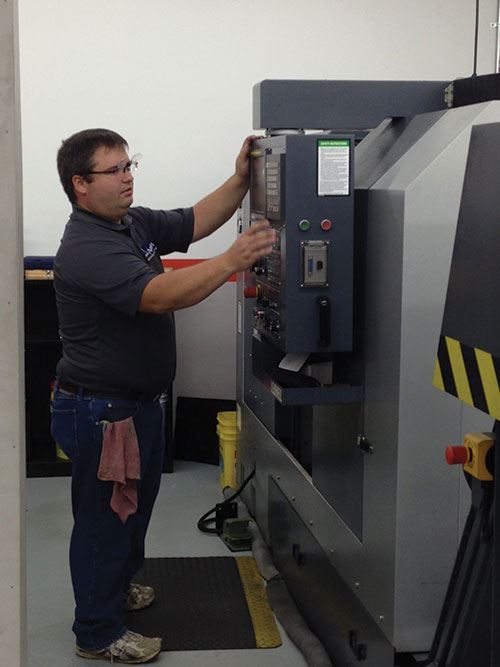Simplifying Work Flow Management
This moldmaker discovered how new business strategies can help better predict, schedule and manage job flow, especially in the cloud.
“What I love most about manufacturing is the ability to design things, make things and, best of all, see the end result,” says Chad Dillaman, owner of Meadville, Pennsylvania-based Dillaman Mold and Manufacturing, a plastic injection moldmaker for applications ranging from safety products to consumer goods.
Since 2010, Dillaman has managed his business alone, overseeing the full design and build for a diverse set of domestic and international customers, including general job shops, tool and die shops, shops that sell safety products, and those that create caps and closures.
It may be a small business, but to its customers, Dillaman Mold doesn’t seem small at all. Casting a larger shadow like this is challenging, so Dillaman must be disciplined about how he runs his business every day. Perhaps his largest challenge is predicting and creating schedules around the ebb and flow of jobs.
Dillaman Mold is sometimes overloaded with orders, but the business also goes through periods of agonizing slowdown. Predicting periods of higher activity to more strategically manage the acceptance of new orders, or simply managing work to reduce activity peaks and troughs is extremely important, as it is for any business of any size.
“You don’t want to accept too many new orders and then not be able to deliver, but at the same time, you don’t want to miss out on new opportunities to increase profitability,” Dillaman says. “In other words, we, as small business manufacturers, walk a very fine line.”
Solutions in the Software
Dillaman realized he needed a formal system to manage his company’s work flow. Like many business owners, he was intrigued as new technologies, especially cloud solutions and business software tailored to smaller manufacturers, became more commonplace. As an engineer, Dillaman understood the importance of technology investment and he also realized that, because manufacturing was transforming so fast, his ambitious, small enterprise would be particularly vulnerable to competition. He knew technology was the answer and that he needed to adapt fast.
Although Dillaman wasn’t necessarily a “tech guru” when he started out, he was open. The promise of adopting new technologies and processes that could transform his business was tempting, and looking back today, Dillaman says he is “blown away by the simplicity” of this transformation. He is especially impressed with how quickly he was able to master new business software.
Dillaman chose Exact Online software from Newton, Massachusetts-based Exact Software for two main reasons: It offered rapid implementation because it was cloud-based (no need to buy and install software on location), and it provided a real-time, 360-degree view of his business for the first time.
While he says he is still far from a tech guru today, Dillaman uses his Exact Online system to actively manage production schedules, and manage inventory and logistics, as well as handle his customer relationships—what many refer to simply as customer relationship management or CRM. Dillaman’s entire business is visible to him through a single platform. He simply logs on to any computer, tablet or mobile device to view the performance of his business, from the status of a single order to overall, up-to-the-minute profitability.
Exact Online software was designed specifically for small business manufacturers and wholesale distributors and includes two cloud-based products: Exact Online Manufacturing and Exact Online Wholesale Distribution. In addition to streamlining tasks such as production and inventory management, logistics, and CRM, it also seamlessly integrates with QuickBooks Online and QuickBooks Desktop. This is designed to help to bridge the gap between common manufacturing and wholesale distribution tasks as well as traditional accounting functions.
Exact Online is intended to replace disparate systems and manual processes, essentially enabling users such as Dillaman to manage every facet of their business under one platform. This software allows ownership and accounting to serve as better trusted advisors to customers.
The fact that Dillaman can take the pulse of his business in real time is powerful, but his ability to log in to his system anytime, from anywhere (not just the office) is equally important to him, a father of two young children. Tasks such as quoting and scheduling, which were once completed using Excel spreadsheets that would be stored in file cabinets on site, are now largely automated with 24/7 accessible data. This helps Dillaman when he must make important decisions about whether or not to take on new orders, and it allows him to make these decisions from home in the evening if he chooses.
Big Ideas from Small Places
The combination of manufacturing-tailored software and cloud technology gives smaller businesses like Dillaman Mold advantages that were once reserved for much larger companies. Little if any expensive or time-consuming customization is required, enabling a small mold manufacturer to be up and running rapidly with the ability to monitor job status, cost of production, inventory and customer status.
“Before moving to cloud-based manufacturing software, I couldn’t confidently quote a job, especially a deadline for delivery, and I had no clue how individual jobs related to other functions in my business, such as accounting and finance,” Dillaman says. “Now my business operations and financial data are integrated. In seconds, I can see the job status and build a schedule that more efficiently spreads work. This not only helps me better run my business, but ensures that I’m delivering the best customer experience possible.”
Delivering the best possible customer experience isn’t reserved for only the largest of businesses. Small manufacturers like Dillaman Mold and Manufacturing must operate on a higher level, too. The operational visibility that software like Exact Online provides makes Dillaman’s business more profitable and also makes his customers happier. CRM capabilities embedded within the software are designed to make customer engagement a more natural part of doing business, proactively providing up-to-date information on pending orders, accelerating delivery and providing better estimates on when products can ship. Making this part of everyday business embeds loyalty-building into the production process.
Whether you’re a one-person shop or have 50 employees, Dillaman’s advice to you is simple: “Don’t be afraid to embrace new technology. Yes, it can be intimidating at first, but once you get it going, it makes business a lot easier and more efficient—trust me.”
Related Content
What Is Scientific Maintenance? Part 1
Part one of this three-part series explains how to create a scientific maintenance plan based on a toolroom’s current data collection and usage.
Read MoreHow to Use Scientific Maintenance for More Accurate Mold and Part Troubleshooting
Discover how adopting scientific maintenance approaches helps improve mold lifespan, minimize failures, and optimize production outcomes.
Read MoreHow to Automate Process and Design
Moldmakers can improve their operations and stop wasting time by taking these six steps for process and design automation.
Read MoreProducts and Services for Multiple Moldmaking Needs
New year, new technology roundup! Featured here is a collection of product offerings, from profile milling cutters to industry-specific CAD/CAM software to innovative hot work tool steels.
Read MoreRead Next
Five Ways to Efficiently Tackle Shop Floor Management
Even the smallest mold shop can afford an integrated shop floor management system that allows for the management of every business transaction—from quote to cash—and is an invaluable tool for ensuring efficiency.
Read MoreHow to Use Continuing Education to Remain Competitive in Moldmaking
Continued training helps moldmakers make tooling decisions and properly use the latest cutting tool to efficiently machine high-quality molds.
Read MoreReasons to Use Fiber Lasers for Mold Cleaning
Fiber lasers offer a simplicity, speed, control and portability, minimizing mold cleaning risks.
Read More












.jpg;maxWidth=300;quality=90)











